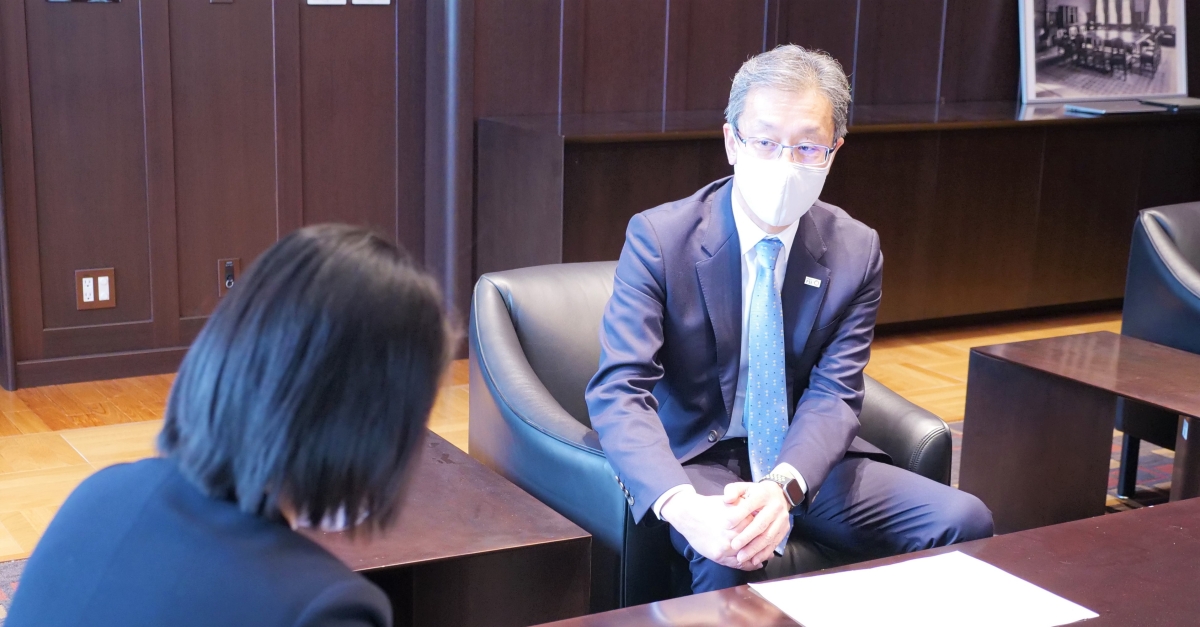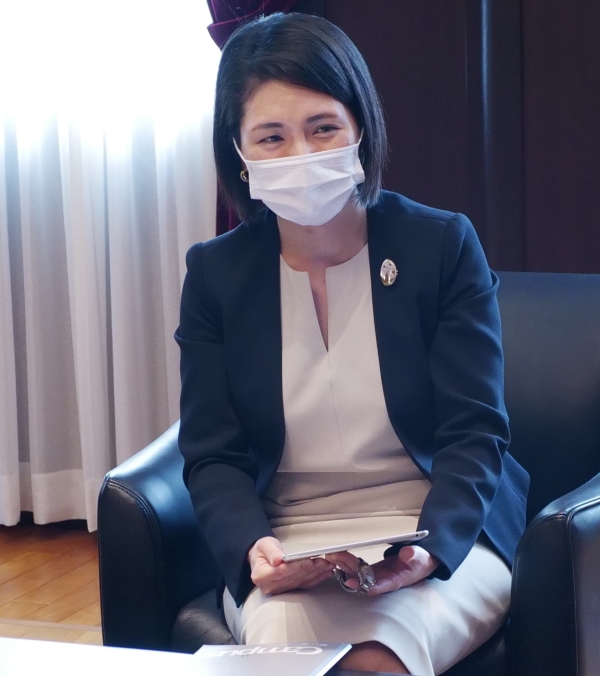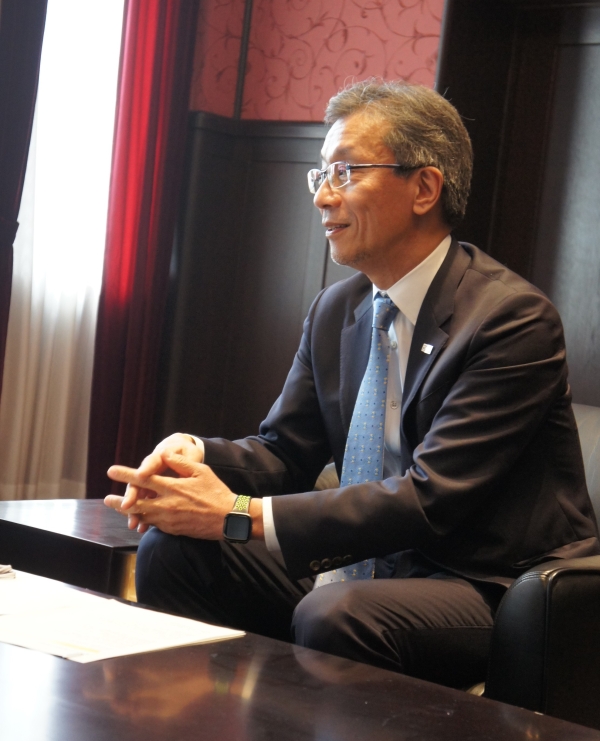Putting dialogue first An interview with President Fujii


UTokyo President Teruo Fujii sits down with Public Relations Office Director Hiromi Yokoyama for an interview on March 26, 2021.
Days before formally taking office, Fujii sat down with Hiromi Yokoyama, a UTokyo professor and director of the university’s Public Relations Office, to share his ideas on building a new model of the university. He also answered a wide array of questions about himself, including reasons for becoming a researcher and his student days at UTokyo.
Yokoyama: You stressed the importance of “dialogue” in your inaugural message. What is your thinking behind it?
Fujii: We have seen many problems emerge in society and around the world, while the COVID-19 pandemic has deprived us of opportunities to meet and talk to each other in person. As a result, I feel that in many situations our thoughts are not fully conveyed to others, causing problems to escalate. When you look at the past year alone, I feel we have witnessed more problems such as civil wars, cases of discrimination and social divisions than usual. I feel strongly that we need more opportunities for people of all stripes to engage in dialogue and develop empathy.
Under the previous administration of President Makoto Gonokami, I was in charge of corporate and social relations, where I observed up close parts of the university that cross boundaries with society. A university needs to explain its activity to the outside world and seek the support and understanding of society. If the university does not make its activities public and continue engaging in dialogue with the public, we will not be understood or accepted by society.
Diversity as a basic principle
Yokoyama: While dialogue is a time- and energy-consuming process, it leads to nurturing of trust. I feel diversity will be key in earning trust from society. Many people have high expectations for your leadership, as you have emphasized the importance of diversity.
Fujii: We should promote diversity as a basic principle. There are many different people with unique backgrounds in the world. If people with different backgrounds get together and discuss a diverse range of ideas, we can raise the level of university activities. It’s no question that the university should value diversity, and it should be our top priority.
Yokoyama: The news that you have put together a nine-member Board of Directors in which a majority — five people — are women caught a lot of attention, especially because Japan lags far behind the rest of the world in gender equality, with few women in leadership positions. Was that a deliberate decision?
Fujii: Not really. I asked people I truly wanted to work with to become members of the board, and it turned out that way naturally. I did not intend that to become news.
Yokoyama: I reviewed materials on the new working groups tasked with creating the “Fujii Plan” (to be unveiled later this year), which sets forth the policies and actions of the Fujii administration over the next six years. I found the names and themes you created to be quite unique. Eight working groups have been set up along the themes of “research,” “education,” “collaboration with society,” “DX (digital transformation),” “GX (green transformation),” “CX (corporate transformation),” “diversity and global” and “MX (management transformation).” Would you elaborate on these groups?

Fujii: Research and education are the foremost areas of university activities, while collaboration with society is something the university engages in together with outside institutions. These are basic activities of the university so I created a working group for each. DX and GX concern all of the education/research/collaborations the university is involved in. “Diversity and global” are concepts that concern the entire university. CX concerns communication between the university and society, as well as the operations and workstyles at the university. In other words, education/research/collaborations are inherent activities of the university, while DX/GX/CX are concepts that cross them all. I was actually drawing a matrix of all these. MX supports university finances. Former President Gonokami pushed for reform of the university to make it a management entity, an idea I would like to promote further.
Yokoyama: In a news conference in October 2020 to announce your selection as the next UTokyo president, you said you wanted to make the university a place where “people from around the world would like to come and join.” What kind of university do you have in mind?
Fujii: UTokyo is a university so it’s of course a place of learning. By “people” I mean everyone — students, international students, researchers and staff. I would like to make the university a place where people would want to come and study or work, a place that they feel excited to be at.
Yokoyama: Does that include utilizing highly skilled staff?
Fujii: Yes. For example, in my previous duty as board director and executive vice president in charge of corporate relations, I worked with fundraising specialists. Whether in the areas of public relations or international relations, experts are absolutely needed. I would like to utilize such talents. At the same time, I think we should send the message that the university is an attractive place to work fresh out of college. In fact there aren’t many other institutions engaged in such diverse activities; you can be involved in student affairs, but you can also plan and hold events. You can do PR or work at hospitals. You can even experience financial work, like asset management.
Reconnecting learning with society
Yokoyama: You said during the October news conference that the university should be a place to reconnect students’ learning with society. Would you elaborate?
Fujii: Today’s world is so unpredictable that students who graduate from college and start working can’t tell what they would be expected to do. But they would still have to cope and use the knowledge they gained at university in real-world situations. So that comment reflected my thinking that students should seek more opportunities to step out of UTokyo while they are still enrolled and apply the knowledge learned in the classrooms in the outside world — like in other countries, municipal governments or other academic institutions. UTokyo has ongoing projects with many companies through academia/industry/government collaborations. Internships are currently connected to job hunting, but I have worked on creating internships that don’t necessarily lead to future employment, but ones that serve as opportunities for students to use their academic learning in real-life settings. I would like to expand such opportunities.
Yokoyama: So you mean students learn twice — in the classrooms and then in the real world.
Fujii: Exactly. Through such experiences, students learn what they haven’t acquired and then get motivated to learn more back at university. That’s what I mean by “reconnecting students’ learning.”
Digitalization of university operations
Yokoyama: You have also touched on digitalization of university operations.
Fujii: We cannot delay the digitalization of administrative procedures any further. Especially under the current pandemic, we should make it possible for administrative staff to avoid using paper as much as possible, which means that we have to connect various existing systems smoothly. It would help reduce administrative burdens, freeing up the staff’s time for new tasks.
Another type of digitalization I would like to push for is one for our campuses. For example, it is not easy for people with disabilities to find the best routes to move across the campus. Digitalization could help them. Also, I would like to make procedures for using rooms and registering for classes easier for the students so they can manage such information on their smartphones. In fact, we started discussing developing an app for such purposes. If students start using the app while in college and continue to use it after graduation, the university would be able to remain connected with them. Alumni relations are extremely important for UTokyo, so I am keen on pushing for digitalization as a way to expand the university community.
Yokoyama: I feel digital tools need to be interactive; if we don’t try to involve users they won’t use them for long. Are you going to involve all UTokyo members in your push for digitalization, not just people in charge of information systems?
Fujii: That’s right. I would like to share the culture among all UTokyo members to make UTokyo a place where everyone would want to join and fulfill their potential.
10 more questions for President Fujii
Here are some short Q&As on President Fujii’s career and background:

You have specialized in “applied microfluidic systems.” What is that?
It’s basically a device technology. You might think all devices are electronic, but they are not; my research has centered on technology to engineer devices that use liquid. The technology’s applications include PCR tests and culturing of cells for drug development.
What is the most memorable class you took while you were an undergraduate student at UTokyo before advancing to the Faculty of Engineering?
Then-Professor Tamaki Ura (who later became Fujii’s supervisor) had a unique class where students would go to the Institute of Industrial Science, then located in Tokyo’s Roppongi district, to read thick diving manuals issued by the U.S. National Oceanic and Atmospheric Administration.
Why did you choose engineering as a major?
I wanted to study technology to explore under the sea. I wanted to make equipment to study the deep sea, and there were few other universities that offered education in the field, so I chose UTokyo.
What made you interested in studying underwater machinery?
When I was a child, I saw the Apollo 11 moon landing (of 1969) and was mesmerized, but what impacted me most was not the landing itself but the technology that made such a feat possible. And since humans had already gone to space, I thought I would want to explore under the sea. In fact, at that time there were only two people who had reached the deepest known point on the Earth's surface, the Challenger Deep, in the Mariana Trench in the Pacific Ocean. So I thought I would specialize in the deep sea.
Why did you become a researcher?
I wanted to stake my claim through work. If I were starting my career now I might be thinking of starting up a company. When I graduated from university it was during the bubble economic era (of the late 1980s), and some of my friends went on to work for banks and securities companies. But I felt that, if I joined a big company, I would be assigned to only a tiny part of the firm’s operations. If I became a researcher, I would be able to write papers and show it to others as my own work. That’s why I became a researcher.
Is it true you like to try new things, like Clubhouse (voice-based social networking app)?
Yes. I like the feeling of not knowing or understanding when I start learning new things. When you enter an unknown territory, you find that there is no one else from your own field and with your perspective. It means you can bring a new perspective to the field. This is related to my emphasis on diversity and my penchant for new things.
What kind of student were you at UTokyo?
I belonged to a diving circle, and we spent days on the Iriomote Island in Okinawa Prefecture and Chichijima on the Ogasawara Islands. It was a lot of fun to dive in places not many people had a chance to go to.
What did you do at an international research unit jointly operated by France’s National Centre for Scientific Research (CNRS) and UTokyo’s Institute of Industrial Science, where you are a principal investigator?
I served as the director of the joint lab unit for seven years from 2007. I managed about 20 researchers who came to Tokyo from France. We invited biology and chemistry researchers to our lab, which specializes in microelectromechanical systems, to carry out interdisciplinary research, such as working with molecules using nanotechnology or applying biotechnology in creating microdevices.
You were a member of a music band in high school. What kind of songs did you play?
I used to play the guitar, copying jazz fusion bands such as the 24th Street Band (an American band popular in Japan in the late 1970s and early 1980s).
Do you have memories of Zurich, Switzerland, your birthplace?
I was born there but didn’t grow up there, so I have no memory from then. But when I went to Switzerland for research some 40 years later, I went to visit the house we used to live in with my mother when she was still alive. We found the house intact.
Date of interview: March 26, 2021
NOTE: President Teruo Fujii tested positive for the coronavirus on April 5, 2021, and resumed his official duties on April 16 after receiving medical treatment for mild symptoms of COVID-19. No infections have been confirmed among the other participants present at this interview.






